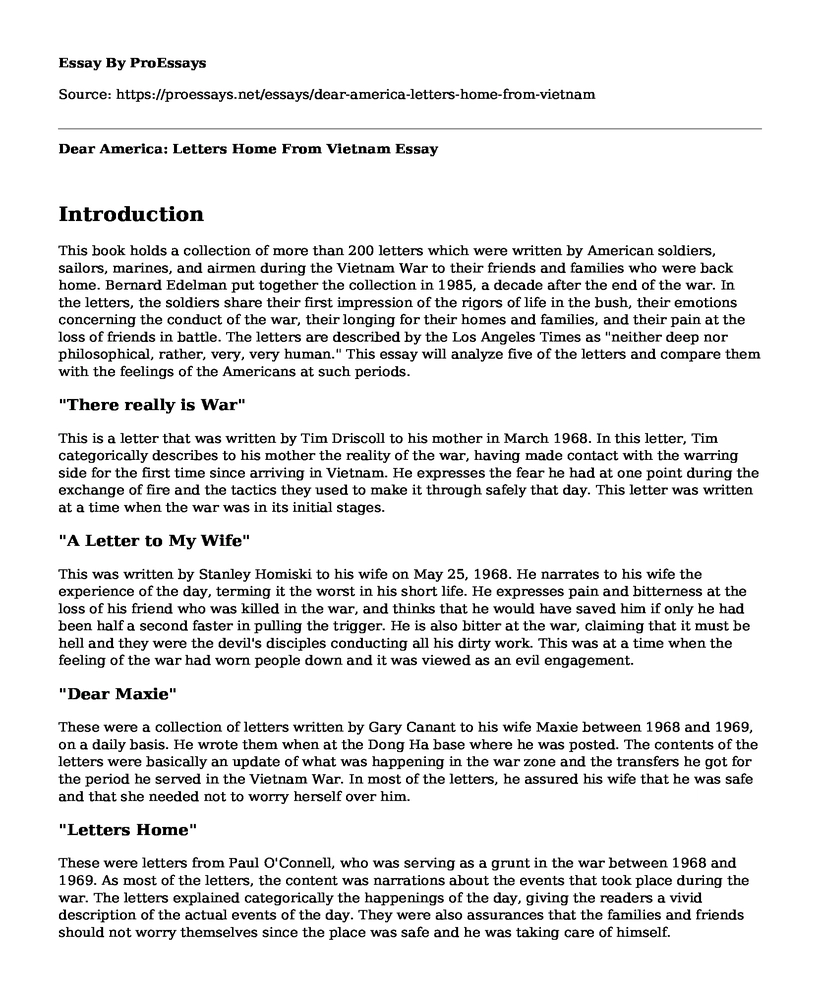Introduction
This book holds a collection of more than 200 letters which were written by American soldiers, sailors, marines, and airmen during the Vietnam War to their friends and families who were back home. Bernard Edelman put together the collection in 1985, a decade after the end of the war. In the letters, the soldiers share their first impression of the rigors of life in the bush, their emotions concerning the conduct of the war, their longing for their homes and families, and their pain at the loss of friends in battle. The letters are described by the Los Angeles Times as "neither deep nor philosophical, rather, very, very human." This essay will analyze five of the letters and compare them with the feelings of the Americans at such periods.
"There really is War"
This is a letter that was written by Tim Driscoll to his mother in March 1968. In this letter, Tim categorically describes to his mother the reality of the war, having made contact with the warring side for the first time since arriving in Vietnam. He expresses the fear he had at one point during the exchange of fire and the tactics they used to make it through safely that day. This letter was written at a time when the war was in its initial stages.
"A Letter to My Wife"
This was written by Stanley Homiski to his wife on May 25, 1968. He narrates to his wife the experience of the day, terming it the worst in his short life. He expresses pain and bitterness at the loss of his friend who was killed in the war, and thinks that he would have saved him if only he had been half a second faster in pulling the trigger. He is also bitter at the war, claiming that it must be hell and they were the devil's disciples conducting all his dirty work. This was at a time when the feeling of the war had worn people down and it was viewed as an evil engagement.
"Dear Maxie"
These were a collection of letters written by Gary Canant to his wife Maxie between 1968 and 1969, on a daily basis. He wrote them when at the Dong Ha base where he was posted. The contents of the letters were basically an update of what was happening in the war zone and the transfers he got for the period he served in the Vietnam War. In most of the letters, he assured his wife that he was safe and that she needed not to worry herself over him.
"Letters Home"
These were letters from Paul O'Connell, who was serving as a grunt in the war between 1968 and 1969. As most of the letters, the content was narrations about the events that took place during the war. The letters explained categorically the happenings of the day, giving the readers a vivid description of the actual events of the day. They were also assurances that the families and friends should not worry themselves since the place was safe and he was taking care of himself.
"Last Letter Home"
This letter was written by Larry Jackson in September 1969. He was writing to his mother and father and it was sad that he died 24 hours after penning down the letter. He promised his parents that he would come home and that he was planning to quit flying since it was too much for him. He was 21 years old but promised that he would come home older.
Cite this page
Dear America: Letters Home From Vietnam. (2022, May 12). Retrieved from https://proessays.net/essays/dear-america-letters-home-from-vietnam
If you are the original author of this essay and no longer wish to have it published on the ProEssays website, please click below to request its removal:
- Literary Essay Sample on Sonny's Blues
- "The Tyger" and "The Lamb" Poems Essay
- The Poem "Adulthood" by Nikki Giovanni Essay
- The Pearl Harbor Attack - Paper Example
- Literary Analysis Essay on "Am I Really a Leader?" by Sally Helgesen
- Essay on The Golden Age of Greece: Humanism, Literature & Philosophy
- Essay Example on Life is Fine: Reckoning Nigh for the Uncomely Aggressor







